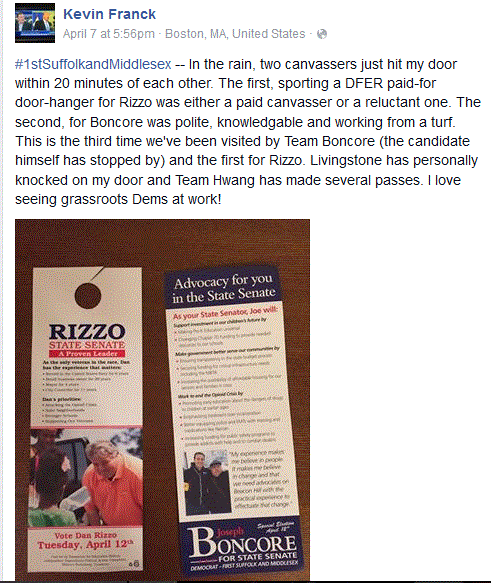A canvasser comes to your door in the special election Democratic primary for the First Suffolk & Middlesex district. Should you trust that person?
I had a simple trigger for this question, a Facebook post by Kevin Franck, which I will reproduce here:

It’s a tale of two canvassers. Read the fine print on the piece on the left and you’ll see it doesn’t come from a candidate, but from Democrats for Education Reform. Both workers were out there in lousy weather. The DFER worker wasn’t exactly brimming with enthusiasm for the candidate. She may not have even been brimming with enthusiasm for the wage by that time either, given the miserable weather. The Boncore worker though “was polite, knowledgeable, and working from a turf.” That means a lot – it’s someone who is probably volunteering, wants to win Kevin’s vote because he/she believes in the candidate, and is working familiar turf - the canvasser is if not a friend, certainly a neighbor, someone who knows the area, cares about it, and can convey why the candidate is good for the district. The Boncore worker is trustworthy.
Political scientists Alan Gerber and Donald Green have shown that door to door canvassing is the most effective method of voter mobilization, due “to the personal, face-to-face delivery of the GOTV messages.” Kevin Franck’s Facebook post offers real time support for that thesis. That was the third visit by a Boncore worker, and Mr. Franck has also been door knocked by candidate Jay Livingstone, and the Diana Hwang campaign has been by several times too. There is much more reason to trust the messages from Boncore, Livingston, and Hwang, than the paid DFER worker. We instinctively trust those who know our “turf” more than we do some hired outsider.
Campaigns need money so if we get curious we can see who the financial supporters are for all the candidates by visiting the website of the Office of Campaign and Political Finance. But when we try to find out who is behind the DFER flier we are shut out. That was paid for by Democrats for Education Reform Independent Expenditure PAC – a SuperPAC that can take unlimited contributions. We can see on its OCPF filing that it is supporting Rizzo, and that on April 1, 2016 it received a contribution from Education Reform Now Advocacy of New York in the amount of sixty thousand dollars. That’s where the trail goes cold though – the New York outfit is an IRS 501(c)(4) social welfare organization, which means its contributors are shielded from being revealed.
That’s right, the citizens of the First Suffolk and Middlesex senate district have no right to know who is trying to influence their votes. Are you feeling the trust?
The issue is not just political but philosophical. As the late political theorist Wilson Carey McWilliams wrote, democracy requires political speech and necessitates we be able to understand and trust it. McWilliams believed that the public benefits from the guidance and assistance of trusted intermediaries to help sort out the tumult of claims involved in a campaign. He meant institutions like political parties, unions, religious communities, and neighborhood groups. But such institutions have declined in recent years – unions in part because they have been under assault from moneyed interests. In the place of them we have shadowy operations like DFER.
We can’t know who DFER really is (hedge fund investers, reportedly) and we can’t be sure why they would want to influence the election in the 1st Suffolk and Middlesex, or for the Ninth Plymouth senate district or the Boston mayor’s race ($1.5 million in 2013).
Professor McWilliams was concerned with The Idea of Fraternity in America (the title of his book). That requires trust, it required a political friendship wanting in our era of declining institutions, polarization, and dark money.
The next time a canvasser comes to your door, engage in a conversation with the one who is “polite, knowledgeable, and working from a turf.” Send the others on their way.

